| Pages:
1
..
9
10
11
12 |
arsphenamine
Hazard to Others
  
Posts: 236
Registered: 12-8-2010
Location: I smell horses, Maryland, USA
Member Is Offline
Mood: No Mood
|
|
Quote: Originally posted by aliced25  |
Sitting here laughing about the number of blackened fingernails and blood-blisters (aside from cuts from shattered magnets) I've acquired.
|
Urgh. Sorry, mate. Wish it was otherwise.
| Quote: | | That plus kids now |
Spare time and uninterrupted sleep will become distant memories.
|
|
|
aliced25
Hazard to Others
  
Posts: 262
Registered: 31-7-2010
Member Is Offline
Mood: No Mood
|
|
here is a bloody interesting paper - it really goes into the nitty gritty of how the researcher 'did' build a working NMR Spectrometer and then
goes off into conjecture into how he'd improve it.
Given the accessibility of the TMS320 series and the McBSP channels integrated into most of them, it comes up with some interesting ideas. Reducing
the number of DDS chips from 2 to 1 also makes a great deal of sense. Why this needs to work with a smart phone when any real research work would
presumably have at least a laptop/etc. is beyond me. If the complex processing/mathematics were handled on the PC/Laptop/Tablet/whatever then the
complexity (parts count, layers, IC's, etc) on the board (plus temperature problems) become less of an issue.
The current magnet is 1.132T with inhomogeneity in the >1,000 ppm range which would appear to be significantly better than that used in that
article (and in others), with the complex & phase-shifted signals used to cancel out inhomogeneity on a much larger scale.
From a Knight of the Realm: "Animated movies are not just for kids, they're also for adults who do a lot of drugs." Sir Paul McCartney
|
|
|
aliced25
Hazard to Others
  
Posts: 262
Registered: 31-7-2010
Member Is Offline
Mood: No Mood
|
|
Ok, playing with Mathematica and FEMM, got two designs on the boil, we'll be playing in the ~60 & ~90MHz range using small Permanent magnets.
Spin Echo pulses were first reported by Hahn (1950) (in the ref request thread), discussed by Solomon (1955) and also by Carr & Purcell (1954).
It would appear that the industry (and research) has gone off on a tangent from that point, the calculations involved in working back from T1-T2 to
get a narrow linewidth spectrum are not trivial (particularly in 1950's terms), whereas Golay's invention of shim coils made work on the concept
unnecessary. It was easier and probably a great deal cheaper to design and build bigger and bigger magnets than to even try and contemplate quantum computing (which of course would allow the complex algorithms to be run in next-to-real-time).
From a Knight of the Realm: "Animated movies are not just for kids, they're also for adults who do a lot of drugs." Sir Paul McCartney
|
|
|
Mildronate
Hazard to Others
  
Posts: 428
Registered: 12-9-2009
Member Is Offline
Mood: Ruido sintetico
|
|
Anbody had schematic on modern components, not from vacum tubes ? ?
|
|
|
aliced25
Hazard to Others
  
Posts: 262
Registered: 31-7-2010
Member Is Offline
Mood: No Mood
|
|
Ok, looking very seriously at this now, as stated in several articles, we aren't going to be transmitting while we are receiving, so if the output can
be digitized effectively (24-Bit Sigma-Delta ADC), a bandpass filter could* "potentially" be used to block the unwanted pulse-signal (thereby
significantly reducing the complexity of the signal chain - no carrier wave, no modulation/demodulation, etc.) which is significantly higher than the
ppm FID signals (which would be, given that 1MHz = 1,000,000 Hz, so the 0-15ppm shifts below 1KHz). The idea being that there is no data collected
until the signal coming out of the receiver coil drops below the bandpass (could we use 1KHz?)
* Anyone got any reason why it wouldn't work?
From a Knight of the Realm: "Animated movies are not just for kids, they're also for adults who do a lot of drugs." Sir Paul McCartney
|
|
|
aliced25
Hazard to Others
  
Posts: 262
Registered: 31-7-2010
Member Is Offline
Mood: No Mood
|
|
According to FEMM if one were to utilize a certain design (using 25mm cubes as well as other components), the output in a central bore section is
125MHz. The homogeneity is 2.93794-2.93798T through that bore, which is around 13-14ppm prior to shimming.
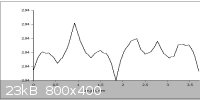
From a Knight of the Realm: "Animated movies are not just for kids, they're also for adults who do a lot of drugs." Sir Paul McCartney
|
|
|
totalsilence
Harmless

Posts: 1
Registered: 13-3-2012
Member Is Offline
Mood: No Mood
|
|
Quote: Originally posted by aliced25  | Ok, looking very seriously at this now, as stated in several articles, we aren't going to be transmitting while we are receiving, so if the output can
be digitized effectively (24-Bit Sigma-Delta ADC), a bandpass filter could* "potentially" be used to block the unwanted pulse-signal (thereby
significantly reducing the complexity of the signal chain - no carrier wave, no modulation/demodulation, etc.) which is significantly higher than the
ppm FID signals (which would be, given that 1MHz = 1,000,000 Hz, so the 0-15ppm shifts below 1KHz). The idea being that there is no data collected
until the signal coming out of the receiver coil drops below the bandpass (could we use 1KHz?)
* Anyone got any reason why it wouldn't work? |
you are going to need to build a tuned LC circuit. The resonant frequency of this circuit will need to be match the lamor frequency as dictated by
your sample / static field strength. The LC circuit is resonant whilst the pulse(s) is applied and then damped afterwards to stop the oscillation in
the circuit. In the read phase the tank is resonant in order to "amplify" very small signals and tune out noise.
I am building a set-up for my doctorate. It is not a simple project!
|
|
|
DavidJR
National Hazard
   
Posts: 908
Registered: 1-1-2018
Location: Scotland
Member Is Offline
Mood: Tired
|
|
I'm planning on doing some DIY NMR experiments. Still awaiting a bunch of deliveries I'll need, but I have assembled a Halbach array:
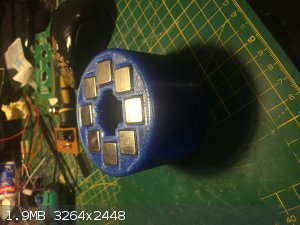 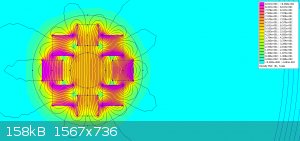
|
|
|
wg48
National Hazard
   
Posts: 821
Registered: 21-11-2015
Member Is Offline
Mood: No Mood
|
|
Quote: Originally posted by DavidJR  | I'm planning on doing some DIY NMR experiments. Still awaiting a bunch of deliveries I'll need, but I have assembled a Halbach array:
|
That was probably tricky to assemble. It looks like you used a jig to hold them then cast the plastic cylinder round them ?
How will you adjust the field strength or do you sweep the generator and receiver frequency using modern electronics?
Borosilicate glass:
Good temperature resistance and good thermal shock resistance but finite.
For normal, standard service typically 200-230°C, for short-term (minutes) service max 400°C
Maximum thermal shock resistance is 160°C
|
|
|
DraconicAcid
International Hazard
    
Posts: 4332
Registered: 1-2-2013
Location: The tiniest college campus ever....
Member Is Offline
Mood: Semi-victorious.
|
|
I will be in awe of anyone who can build a functional NMR at home.
That being said, commercial NMRs have come down in price, enough that a benchtop NMR can be had for about $30K.
Please remember: "Filtrate" is not a verb.
Write up your lab reports the way your instructor wants them, not the way your ex-instructor wants them.
|
|
|
Texium
Administrator
       
Posts: 4580
Registered: 11-1-2014
Location: Salt Lake City
Member Is Offline
Mood: PhD candidate!
|
|
I second that... and if they could also
make their detailed design publicly available here so that others could replicate, that would be even more amazing. I'll certainly be following this
thread!
|
|
|
Ubya
International Hazard
    
Posts: 1247
Registered: 23-11-2017
Location: Rome-Italy
Member Is Offline
Mood: I'm a maddo scientisto!!!
|
|
Quote: Originally posted by DavidJR  | I'm planning on doing some DIY NMR experiments. Still awaiting a bunch of deliveries I'll need, but I have assembled a Halbach array:
|
shouldn't the field be as uniform as possible?
---------------------------------------------------------------------
feel free to correct my grammar, or any mistakes i make
---------------------------------------------------------------------
|
|
|
DavidJR
National Hazard
   
Posts: 908
Registered: 1-1-2018
Location: Scotland
Member Is Offline
Mood: Tired
|
|
Quote: Originally posted by wg48  |
That was probably tricky to assemble. It looks like you used a jig to hold them then cast the plastic cylinder round them ?
How will you adjust the field strength or do you sweep the generator and receiver frequency using modern electronics? |
It’s not cast, I 3D printed the blue thing and then inserted the magnets. It was pretty tricky to get them all in though...
No varying the field for scanning, i’ll vary the frequency as needed instead. I’d rather use a Fourier transform approach and not do old school
scanning though.
Yes, it should be, at least over the sample area.
I’m not certain this magnet design is good enough but it’s a start. I may well need to modify the design. I may also need to add some small shim
coils but we’ll see how it goes.
The magnets I bought are 15x15x50mm, N48.
[Edited on 16-12-2018 by DavidJR]
[Edited on 16-12-2018 by DavidJR]
|
|
|
wg48
National Hazard
   
Posts: 821
Registered: 21-11-2015
Member Is Offline
Mood: No Mood
|
|
Quote: Originally posted by DavidJR  |
No varying the field for scanning, i’ll vary the frequency as needed instead. I’d rather use a Fourier transform approach and not do old school
scanning though.
|
Yes that's the way to do it these days. Look how a modern cell phone works or a the front end of a satellite receiver or a stick TV receiver for a
PC. Though i suspect for the best signal to noise it is still narrow band tuned receiver but there is probably not a significant difference unless
your trying to pick up signals from one of the Voyager spacecraft.
I read a few pages of the thread. The analysis of the shimming coils is similar to the way multi axis optical pointing systems trim out pointing
errors due to mechanical inaccuracies between the axes, alignments of the sensors and geometric distortion of the sensors. Its complicated maths (big
equations) but in the final analysis it just a polynomial correction for each axis. I guess the trick in shimming is working out where to put the
coils to generate the polynomial correction. The first colour TVs had complicated trimming to align the three electron beams and correct image
distortions.
An interesting project do keep us informed of your progress.
Borosilicate glass:
Good temperature resistance and good thermal shock resistance but finite.
For normal, standard service typically 200-230°C, for short-term (minutes) service max 400°C
Maximum thermal shock resistance is 160°C
|
|
|
mattharbowy
Harmless

Posts: 1
Registered: 12-11-2019
Location: Los Angeles
Member Is Offline
|
|
FYI: just stepping in to revive this 2012/2018 thread on DIY NMR. I'm just going through what's been published before on the subject, and I'm planning
out some of my first initial experiments and gearing up my toolset. In the next couple of months I'll try to post more on what I find out. At the end
of this it looks like I'm going to have to learn a lot of AC analog electronics I never bothered to learn just to get to first base with this project,
but it looks interesting and worthwhile, and if anything, the resurgence of benchtop NMRs doing 2d pulse sequences gives me hope that I can get to a
spectrum of ethanol by end of year.
|
|
|
Ubya
International Hazard
    
Posts: 1247
Registered: 23-11-2017
Location: Rome-Italy
Member Is Offline
Mood: I'm a maddo scientisto!!!
|
|
Quote: Originally posted by mattharbowy  | | FYI: just stepping in to revive this 2012/2018 thread on DIY NMR. I'm just going through what's been published before on the subject, and I'm planning
out some of my first initial experiments and gearing up my toolset. In the next couple of months I'll try to post more on what I find out. At the end
of this it looks like I'm going to have to learn a lot of AC analog electronics I never bothered to learn just to get to first base with this project,
but it looks interesting and worthwhile, and if anything, the resurgence of benchtop NMRs doing 2d pulse sequences gives me hope that I can get to a
spectrum of ethanol by end of year. |
i'm looking forward to it, it is a really interesting project, it is one of the many things i'd like to do. as amateurs we don't have many modern ways
of checking if the compound we made is what we meant
---------------------------------------------------------------------
feel free to correct my grammar, or any mistakes i make
---------------------------------------------------------------------
|
|
|
wg48temp9
National Hazard
   
Posts: 783
Registered: 30-12-2018
Location: not so United Kingdom
Member Is Offline
|
|
I was curious as to how difficult DIY NMR detection or spectroscopy would be. Apparently detecting NMR in cobalt nuclei can be done with a grid dip
meter but that is a special case. A quick google reveals several DIY projects. Here is one one with a description the instrument https://www.youtube.com/watch?v=b2n1-nvo7d4. Below is a pic of the instrument,
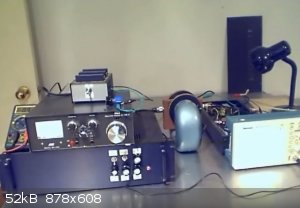
Below is some general info on NMR
mmkhttps://www2.chemistry.msu.edu/faculty/reusch/VirtTxtJml/Spectrpy/nmr/nmr1.htm
Attachment: NMRBasics_2016.pdf (4.6MB)
This file has been downloaded 1352 times
I am wg48 but not on my usual pc hence the temp handle.
Thank goodness for Fleming and the fungi.
Old codger' lives matters, wear a mask and help save them.
Be aware of demagoguery, keep your frontal lobes fully engaged.
I don't know who invented mRNA vaccines but they should get a fancy medal and I hope they made a shed load of money from it.
|
|
|
Ubya
International Hazard
    
Posts: 1247
Registered: 23-11-2017
Location: Rome-Italy
Member Is Offline
Mood: I'm a maddo scientisto!!!
|
|
yup i saw that when i was researching the subject. radar magnets are not something that is usually sold in italy lol, i'll have to make my own
electromagnet from pure iron and a helmholtz coil. the RF part of the project is what bugs me, and i can't find an easy enough "tutorial" or at least
explanation, it is all or very theoric, or too much technical, so i can't follow (i don't have an electrical engeneering background)
---------------------------------------------------------------------
feel free to correct my grammar, or any mistakes i make
---------------------------------------------------------------------
|
|
|
wg48temp9
National Hazard
   
Posts: 783
Registered: 30-12-2018
Location: not so United Kingdom
Member Is Offline
|
|
Quote: Originally posted by Ubya  | | yup i saw that when i was researching the subject. radar magnets are not something that is usually sold in italy lol, i'll have to make my own
electromagnet from pure iron and a helmholtz coil. the RF part of the project is what bugs me, and i can't find an easy enough "tutorial" or at least
explanation, it is all or very theoric, or too much technical, so i can't follow (i don't have an electrical engeneering background)
|
I was hoping to get a feel for the magnitude of the task in terms of the strength and homogeneity of the required magnetic field, the sample size
and the signal strength and noise. But so far I have no data. From the construction of that DIY system it does not look like it has any thing
exotic. i am guess that the RF part could be achieved with a digital radio receiver and perhaps a low noise pre-amp.
[Edited on 2/9/2020 by wg48temp9]
I am wg48 but not on my usual pc hence the temp handle.
Thank goodness for Fleming and the fungi.
Old codger' lives matters, wear a mask and help save them.
Be aware of demagoguery, keep your frontal lobes fully engaged.
I don't know who invented mRNA vaccines but they should get a fancy medal and I hope they made a shed load of money from it.
|
|
|
Ubya
International Hazard
    
Posts: 1247
Registered: 23-11-2017
Location: Rome-Italy
Member Is Offline
Mood: I'm a maddo scientisto!!!
|
|
i have no clue, but the receiver isn't the only part, you also need a transmitter that can produce a high power, very short, broadband signal with a
precise and tunable timing
[Edited on 10-2-2020 by Ubya]
---------------------------------------------------------------------
feel free to correct my grammar, or any mistakes i make
---------------------------------------------------------------------
|
|
|
Ubya
International Hazard
    
Posts: 1247
Registered: 23-11-2017
Location: Rome-Italy
Member Is Offline
Mood: I'm a maddo scientisto!!!
|
|
i think i found a solution, probably the best as of right now
http://kuchem.kyoto-u.ac.jp/bun/indiv/takezo/opencorenmr2/in...
it is open source, he/them described the board and the software
https://opencorenmr.github.io/opencorenmr-docs/
in theory one could send the eagle files to a PCB manifacturer, ans the populate the board with the right components by hand
---------------------------------------------------------------------
feel free to correct my grammar, or any mistakes i make
---------------------------------------------------------------------
|
|
|
wg48temp9
National Hazard
   
Posts: 783
Registered: 30-12-2018
Location: not so United Kingdom
Member Is Offline
|
|
Quote: Originally posted by Ubya  | i have no clue, but the receiver isn't the only part, you also need a transmitter that can produce a high power, very short, broadband signal with a
precise and tunable timing
[Edited on 10-2-2020 by Ubya] |
I don't know how precise or broadband the drive signal has to be but you can get an idea from the diy unit I linked to. That unit used 555 timer chips
for the envelope of the drive signal which are simple RC timers probably about 5% timing accuracy. So the envelope timing is not critical.
You can buy a 50MSa/s sample rate, 14bits vertical resolution Arbitrary Waveform Generator for about £100 that will generate that signal.
https://www.ebay.co.uk/itm/FY6800-60M-DDS-Signal-Generator-2...
There are potentially problems with fine control of the rf signal.
Though a few 555 and an LC oscillator could used with at least one stage of amplification to drive and isolate power amp.
Ebay sells 70W linear power amps 3.5 to 30MHz for £24 including postage
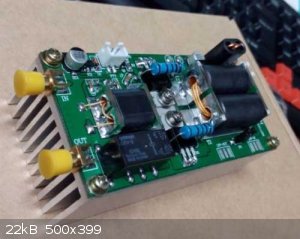
I have made some progress on the task size for the magnet and receiver. The DIY unit I linked to states the magnet is 4,500 Gauss and that in can be
varied by a few hundred Guass with the 10A coils. That implies it could be replaced with an electromagnet with about 20 times the ampere turns. Ok
that's a big coil at least x20 of size of the small adjustment coils and much bigger to keep the power down. However that set up does not use all
the surface area of pole faces. With more focused pole face the total flux could be reduces and hence the coil size could be reduced. I think the
magnet construct is big task but doable probably using transformer cores as the main material with sold soft iron poles faces or the neodymium
version shown in this thread or if your lucky and find an other big magnatron magnets.
Again from the linked system the receiver uses a amp with voltage gain of 10,000 apparently driving a scope displaying signal at about 100mV implying
the input signal is about 10uV. Typical short wave radios are in the 2.-3uV range so suspect a digital radio stick will be similar for example :
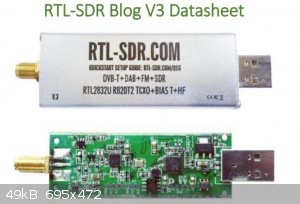
cost about £20 direct digitisation up to 28MHz but only 8bit It has a built in FFT. I don't know how easy it will be interface to it. The
hardware and some of the PC software to use it is open source.
This is just the initial look at the feasibility and practicality.
I am wg48 but not on my usual pc hence the temp handle.
Thank goodness for Fleming and the fungi.
Old codger' lives matters, wear a mask and help save them.
Be aware of demagoguery, keep your frontal lobes fully engaged.
I don't know who invented mRNA vaccines but they should get a fancy medal and I hope they made a shed load of money from it.
|
|
|
Texium
|
Thread Topped
17-2-2022 at 20:44 |
Dr.Bob
International Hazard
    
Posts: 2732
Registered: 26-1-2011
Location: USA - NC
Member Is Offline
Mood: No Mood
|
|
For any of you electronics people, I have a pile of old electronics books, guides, and such, some may be obsolete, but not sure. If you have an
interest in NMR, I have a few books on that, more on the electronic side, as well as Techtronix 2465 Ocilliscope Servcice manual if anyone wants it.
If anyone here likes NMR, I can give them to you, as well as some tubes, caps, and other stuff. I have many tubes (most of which are dirty or
etched), as well as hundreds of caps that were used once. But if you want tubes and can clean them, I can provide a bunch. Good luck, if anyone
here gets close to building one, like DavidJR, and is still active, I also know a guy who fixes them, and he has a garage full of parts and pieces.
He is the only person I know who took apart a 300 mHz superconducting magnet in his garage (it was not energized.) I mean with a sawzall. Great
photos. But know I understand the mechanics of them much better now.
|
|
|
Rainwater
National Hazard
   
Posts: 919
Registered: 22-12-2021
Member Is Offline
Mood: indisposition to activity
|
|
Getting closer. The youtuber, Applied Science released this yesterday
https://youtu.be/JO_EHceV9sk
"You can't do that" - challenge accepted
|
|
|
Twospoons
International Hazard
    
Posts: 1324
Registered: 26-7-2004
Location: Middle Earth
Member Is Offline
Mood: A trace of hope...
|
|
I saw that too. Interesting, relatively simple, but a PITA to retune for each thing you want to look for.
Helicopter: "helico" -> spiral, "pter" -> with wings
|
|
|
| Pages:
1
..
9
10
11
12 |